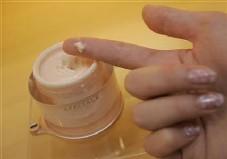 | « Back to article | Print this article |
Mirror, mirror on the wall, who's the fairest of us all? Women over the ages have oft repeated this line as they have clamoured to look the best. While the options earlier were limited, the market today has quite a few products from Hindustan Unilever's Fair & Lovely to Cavincare's Fairever and Garnier Light.
While the options earlier were limited, the market today has quite a few products from Hindustan Unilever's Fair & Lovely to Cavincare's Fairever and Garnier Light.
HUL, however, continues to dominate the Rs 1,800-crore women's fairness cream market in India with an over 70 per cent share, followed by Cavin Care at 10 per cent and Garnier at around seven per cent.
While challenging HUL may not be easy, Lóreal, whose mass-market brand is Garnier, is stepping up its focus on the market.
The French cosmetic giant will launch a second fairness cream called Garnier Light Ultra on April 1.
Designed and developed in India, the product comes after five years since Garnier Light was first introduced in the Indian marketplace.
The product will be endorsed by actor Priyanka Chopra dwelling on the aspect of "fairness and dark spot reduction".
"From time to time, we do India-specific innovations through products and benefits. Our studies showed that Indian women want a blemish-free skin," says Richa Singh, marketing manager, Garnier India. "We have attempted to address this need," she says.
But Garnier will not be the only one speaking this language.
In the last one year, both HUL and Cavincare have repositioned and relaunched their fairness products on the platform of flawless complexion and beauty.
Executives at Lowe Lintas, the creative agency that handles Fair & Lovely, say that women in general want more than just general fairness today.
"Gone are those days when fairness alone was the parameter to judge beauty. Flawless skin is something that most women seek and fairness creams are expected to deliver this in some way," says a Lowe Lintas executive on condition of anonymity.
HUL, for instance, played up the aspect of "clear fairness" during its makeover last year. The product sported a new tagline called gorepan sa kahi zyaada, saaf gorapan, which was different from earlier brand statements.
In the past, Fair & Lovely spoke about how fairness could change one's destiny through taglines such as zindagi roshan kare and badle aap, badle zindagi.
But not any more. Industry experts attribute this trend to the uptrading in beauty. "Consumers themselves have been moving up the ladder," says Shirish Pardesi, senior analyst at Mumbai-based brokerage Anand Rathi.
"It is no more about using a shampoo or cream alone. The accent now is on what problem the product can solve. This lends itself to some amount of premiumisation, which is why the focus on this segment."
By and large consumers are averse to taking chances with products perceived to be low in value when it comes to personal care, say analysts. "That is also contributing to this trend of premiumisation," says Pardesi.
Agrees Mohan Goenka, director, Emami Ltd, "Fairness as a concept is evolving," he says. "Look at the way men have taken to fairness products."
Though smaller than the women's fairness cream market at Rs 200 crore (Rs 2 billion), the men's market is growing faster at 25-30 per cent per annum.
Women's, on the other hand, is growing at 10 per cent per annum. Key players in the men's space include Emami's Fair & Handsome, HUL's Fair & Lovely Menz Active and Garnier Men.
But like the women's segment, the men's market is also undergoing changes in terms of perception of fairness.
"The underlining premise in both men's and women's is the same, most want the best," says Goenka.